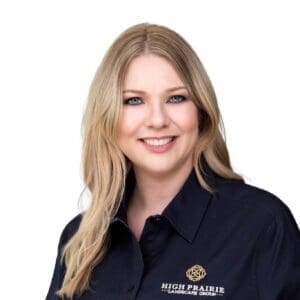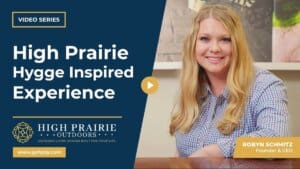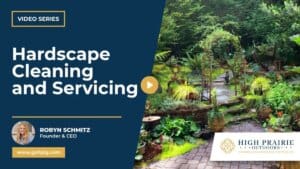Owner and Founder Robyn Schmitz was recently featured on the Thinking Bigger Radio podcast on an episode titled: High Prairie Outdoors: Sculpting the Landscaping Industry
The show was originally published here:
You can listed here:
Here is the show’s transcript:
Welcome to smart companies. Thinking Bigger Radio. Get the inside scoop on how America’s most successful business owners transform their entrepreneurial vision into reality. And listen in as some of the top business minds in the country serve up practical advice, tips, and insights for growing your business. Now here’s your host, Kelly Scanlon.
Kelly Scanlon: Good morning. Welcome to Smart Companies Radio. I’m Kelly Scanlon. Publisher of “Thinking Bigger Business Media.” Our guest today is Robyn Schmitz. She’s a green industry educator, a landscape consultant, and she’s owner of a landscaping company here in Kansas City called High Prairie Outdoors.
We’re very happy to have High Prairie Outdoors as a part of our 28 team class of 25 under 25.
And we’re really enjoying getting to know them better through these podcasts. So Robyn, we’re very eager to hear more about your story today. Welcome to the show.
Robyn Schmitz: Kelly, thanks so much for having me. I’m glad to be here.
Kelly Scanlon: Part of what intrigues me about your story is the educational part. And so I wanna know how you got started and as you answer that, explain if you always had it in mind from the beginning that you were gonna become an industry educator.
Robyn Schmitz: You know, it’s really interesting. I think that we all, business people in any field, we feel that there are things we can improve upon and for me, education is a big piece of that. And so as I was beginning to do this thing, I really got great inspiration from my professors at K State, from the industry I just educators out there. And for me, I want to give back like others have given back to me.
So being able to educator others and help improve their businesses improved the industry as a whole, which means we all win. So-
Kelly Scanlon: Right.
Robyn Schmitz: A stronger industry is better for everybody.
Kelly Scanlon: Definitely. And I think a lot of times, as with so many industries or professionals that we depend on, we really don’t know what we don’t know. And so whether we’re going to get our car fixed or whether we’re going to the doctor or whether we’re going to someone to do landscaping for us, we really don’t know the ins and outs of that and it would be very easy to just follow along with somebody who maybe is unscrupulous. And so the fact that you’re raising the standards of the industry, as anybody does-
Robyn Schmitz: Sure.
Kelly Scanlon: In this industry is a really great thing. You have a book out in fact.
Robyn Schmitz: Yes.
Kelly Scanlon: Outdoor Living. Tell us about that.
Robyn Schmitz: Yes. Yes. So we are big educators of our clients as well, not just the industry as a whole. Because we believe educated clients make the best decisions for themselves.
Kelly Scanlon: Yeah.
Robyn Schmitz: Again, when they’re incredibly happy, that’s a win win for both people as well, the business and the client. And so it became apparent as we started trying to find resources to provide to these clients who are considering investing 10’s of thousands of dollars in their property. A place to go to learn all of the nuances they need to learn to make an educated decision. And what we found was there was no single thorough guide that went over both design, construction, and then how to budget for it.
And so since we could not find that, we basically created it. So it’s been a great tool.
Kelly Scanlon: Yeah. Is this available somewhere that we can go and purchase or is it something that you give you clients as part of your engagement with them? How do you get a hold of the book?
Robyn Schmitz: So it is going to print basically in three weeks. So that’s an excellent question. And it will be sold on Amazon.com through the author self-publishing site there. And so you’ll be able to get it on Amazon, but we also, you know, because we’re using it as an educational resource, we’ll also be providing it to clients and things like that.
Those that are serious about wanting to invest wisely for themselves.
Kelly Scanlon: Yeah. And I would just add that in addition to the one on one coaching that you do to your clients, in addition to this book, and-
Robyn Schmitz: Yeah.
Kelly Scanlon: The work that you do with others up and coming in the industry, on the educational part, you also do a lot of speaking as well. And so it’s very well rounded approach. You speak at university and-
Robyn Schmitz: Yup.
Kelly Scanlon: At Green Educational events and different places like that. What is your inspiration for starting this company?
Robyn Schmitz: You know, it was really a catalyst. So I graduated college and got this great education. I worked my way through college at a landscape company there. And I learned a lot of really excellent practices. Then during that time I got awarded an internship where I went to New Mexico and worked at one of the best companies in the nation. At that time, I had this grandiose idea that when we moved to the city and moved to Kansas City to landscape, that I would be working for one of those companies that was professional and ethical and grew people.
And so I got here and started working and had some great opportunity and learned a lot of things. But it was apparent that there were an incredible amount of companies out there under serving. Under serving both their clients and cutting corners on quality in ways that people didn’t even know that the quality was being cut because they didn’t know any better.
Kelly Scanlon: Right, right.
Robyn Schmitz: That catalyst … you know how you just get kind of fired up about something?
Kelly Scanlon: Yeah.
Robyn Schmitz: For me, it was just that, I don’t know Kelly, I’m not wired to settle for mediocre when there’s possibility to do better for people. And so I kinda hated the idea that people were spending their hard earned money and really getting mediocre results and they didn’t even know it. And so we just kind of sat out to do something better, ethical, and creative. Cookie cutter is not a description we ever want to associate with and when people invest, why would they want that?
Kelly Scanlon: Right.
Robyn Schmitz: So that catalyst of just seeing mediocre work happening at both the large and small places was like, no, people deserve better. We love Kansas City and Kansas City deserves better.
Kelly Scanlon: Do you work with primarily residential, do you work with commercial, like with construction, goes to finish off with landscaping, or a little bit of both or what’s the balance there?
Robyn Schmitz: We are probably 95% residential and 5% commercial. We are so quality based and innovation based. We find that our residential client really value those extra touches and details. Because they’re intimately involved with the landscape when it’s a residential space.
Kelly Scanlon: What are some of the trends … I know you don’t want cookie cutter and-
Robyn Schmitz: Yeah.
Kelly Scanlon: So I’m a little hesitant to use the word trends-
Robyn Schmitz: Sure.
Kelly Scanlon: But I would imagine that some of your customers requests are driven by some of these trends that they see at their neighbors and different places and so, knowing you though, you come in and you put some sort of innovative spin on that. But-
Robyn Schmitz: Yeah.
Kelly Scanlon: What are the things that you’re seeing that are very popular today that maybe you take the extra step with- Robyn Schmitz: Yup.
Kelly Scanlon: Or change a bit. What do you see in?
Robyn Schmitz: Yeah. So it’s really just … trends can kind of be applied to categories. It can be everything from material usage to design trends. And I really think that there’s two areas there. As far as design trends go right now, we’re doing a lot of multi-use outdoor living spaces where it used to be that the idea of outdoor living rooms was just this incredible idea. Well now that we’ve all adjusted to that, people are really thinking further about that outdoor space.
And so instead of just a kitchen or just a seating area, we’re seeing a lot of things where we’re putting sports [inaudible 00:08:03] lounges with our kitchens so that people can host the big game outdoors on their outdoor space. So we’re seeing a lot of combo uses. Pools with bars built into the side so that you have the kind of combo use. Sunken fire pits where one side of the fire pit is also a seating area.
It’s really taking it a step in the evolution, excuse me, of outdoor living design and saying, “How can we maximize this space in a way where the end users can use this for multiple uses?” And so, yes we love outdoor kitchens, yes we love just the patio space, but when you can get that impact on more than one level, you’re hitting multiple layers there. And then lastly just some of the materials we’re using. Here in a couple of weeks, we’re installing a [perbila 00:08:56] system that is a remote controlled [perbila 00:08:58].
That sounds crazy to say out loud, doesn’t it?
Kelly Scanlon: It does.
Robyn Schmitz: So, yeah, it absolutely does. But basically what it is, is it’s a [perbila 00:09:07] system that looks classy so it still fits the design parameters that we hold. But with a remote you can change the direction of the top [inaudible 00:09:19], if you will, of that [perbila 00:09:21] to kinda move with the wind and rain. And you can make those go all the way flat so that your [perbila 00:09:26] is rain proof.
Kelly Scanlon: Wow.
Robyn Schmitz: So rainy afternoon, you still can use that outdoor space. And that’s something that’s unheard of.
Kelly Scanlon: Yeah.
Robyn Schmitz: So just those things that are … you know, you don’t know what’s out there. And we really hope to bring that to Kansas City because there are so many incredible, between the materials, the design, all of those things. We can have it here just like they have it on the coast.
Kelly Scanlon: Yeah. So it’s not just about a cute flower garden or keeping the bushes trimmed in a certain- Robyn Schmitz: Sure.
Kelly Scanlon: Way, rounded versus square or anything … it’s really becoming … it’s all of those things too, but it’s really more about making the outdoors an extension of your indoors and being able to enjoy that, but yet have protection from the elements, as you said wind and rain-
Robyn Schmitz: Sure.
Kelly Scanlon: Really just having it all is what you’re seeing.
Robyn Schmitz: Yes. I mean, we’re here to provide an experience for people. Landscapers wouldn’t exist if we weren’t thinking about what kind of experience we can provide to those people who walk through these spaces or use these spaces. All about that experience.
Kelly Scanlon: It sounds like you have really made your mark within the industry and with the educational component, you’re really becoming an authority in the industry as well. But certainly you had some challenges. Every business owner I’ve ever talked to has had some-
Robyn Schmitz: Absolutely.
Kelly Scanlon: Even if they’ve had phenomenal growth from the get go. What-
Robyn Schmitz: Absolutely.
Kelly Scanlon: Have been some of yours?
Robyn Schmitz: You know, when the business first started out, I would say perception was my biggest challenge. Not that we’re not in a very good place today, but when this young female stepped out of the truck to meet with a client, people didn’t know who I was yet or what capabilities our company possessed. And oftentimes they would say these things. “Oh. Did the owner send the secretary? I thought we-
Kelly Scanlon: Oh no.
Robyn Schmitz: Were going over a construction project today.” And you know the funny thing Kelly, is they genuinely were not trying to be offensive or be- Kelly Scanlon: Right.
Robyn Schmitz: Person. I just-
Kelly Scanlon: Right.
Robyn Schmitz: Did not fit the mold of a landscaper, in their mind anyway. And so there was this perception to kind of overcome the first two years until High Prairie had a reputation of its own. And so battling that, I always felt like I needed to be two to three steps ahead of the competition because you don’t wanna overcome the perception. You wanna say, “Here’s why we as a company are good.”
And it has nothing to do with any single one thing, but this culture and what we believe in will offer something different.
Kelly Scanlon: Right. One of the things I’m curious about especially with-
Robyn Schmitz: Yeah.
Kelly Scanlon: The educational component is-
Robyn Schmitz: Sure.
Kelly Scanlon: Did you have any other female mentors and whether you did or not, do you aspire to be that person for other females coming up in the industry?
Robyn Schmitz: Yes to both. My first female mentor, Dr. Kathy [Wavis 00:12:31] at Kansas State University, has had a massive impact on my career and my life. And she is such a proponent of the industry and teaching and taking those paradigm people have of roles and saying, “You can do whatever you want to do. Just apply yourself and do it well.” And so I would say industry related, she was and is one of the most impactful people on my career.
And in that and because of my appreciation for that, I hope to return that as much as I can to other people within the industry. Not just female, but also female, male or female. Giving back like that. I wouldn’t be where I am today without the help of others.
Kelly Scanlon: Right. The paying it forward. You’re talking about how you had to stay two to three steps ahead to basically, I mean put it bluntly, to prove yourself because-
Robyn Schmitz: Yes.
Kelly Scanlon: As you said, people were not expecting a younger female to show up to talk with them about a project. And so you were always having to prove yourself basically. You have created a scale for analyzing professionalism. I.E. key performance metrics. Can you share that with us?
Robyn Schmitz: Yeah. So basically every business, and this doesn’t apply to just landscape company. There’s not a business person in the world who doesn’t love the compliment, excuse me, of being called a consummate professional. And as business owners, when we’re starting out, we know to track the obvious metrics. We know to probably track revenues and margins and those types of things. But there are so many, what I would call soft touch parts of running a business that it’s incredibly hard to kinda put your thumb on and understand where you are or track that progress.
And so via trial and error, we created something kind of called, it’s called a professionalism matrix. And our theory is that every single business falls somewhere on the professionalism scale between zero and 100 on that scale. And what I mean is, it doesn’t matter what you do, there’s always room to increase your professionalism. Now the first question that you’re gonna ask Kelly, is probably, “Well wait Robyn. How do you sign a number to professionalism?” I mean, what-
Kelly Scanlon: Right.
Robyn Schmitz: Why would someone want to do that? How does that make sense? Well-
Kelly Scanlon: Yeah. So intangible in …
Robyn Schmitz: Yeah.
Kelly Scanlon: It’s intangible, yeah. And it might differ what’s professionalism in one industry may differ a little bit in a different industry.
Robyn Schmitz: Exactly.
Kelly Scanlon: Or what-
Robyn Schmitz: Exactly.
Kelly Scanlon: Waited a little more highly in a different industry.
Robyn Schmitz: Exactly. So what we did was we created five indicators of professionalism that we score ourselves on twice a year. And those five indicators are basically sections within your business that you can rate yourself on and observe areas where you have room for improvement. Those five areas are the area of perception, how clients and people view your business and how it operates. Education and training, which helps you deliver in an expert way.
Execution, which is basically where the rubber meets the road truly. Execution and not having a way to grade yourself on that is crazy. Because that’s where it actually happens. That’s where the magic happens. Culture, is something that a lot of people need to be tracking because that’s really the special sauce of many, many businesses.
Kelly Scanlon: Definitely.
Robyn Schmitz: And last, but definitely not least, and this is the most obvious one, but your financials and budgeting. And the metrics related each of those five indicators is sitting down with a group, and we have a form for this actually Kelly. And each of those five indicators, we have anywhere from two to five things that we have identified as important to track in order to increase our professionalism score from year to year.
And so on this form we have subjective, honest opinions. The managers also get the form twice a year. And we track our score and we see where we’re struggling. And in doing that, essentially we’re able to kind of identify where in the business can we kind of tighten things up a little bit. So you may fill out the professionals and score a 40 and set the goal of getting to 60 by the end of year one.
Identify where you’re having those issues. But the cool thing about a form like that is we have one that’s landscape industry kind of focused.
Kelly Scanlon: Right.
Robyn Schmitz: But there’s another form where we just have the key for how to track each of those things and people can fill in their own metrics that they need to track in each of those indicator areas.
Kelly Scanlon: Yeah.
Robyn Schmitz: So in that way, you’re applying the numbers to something you’ve never applied to numbers before by rating yourself.
Kelly Scanlon: And so you do this. You sit down and you go over this semi-annually-
Robyn Schmitz: Yup.
Kelly Scanlon: Quarterly.
Robyn Schmitz: Yup.
Kelly Scanlon: How often do you do it?
Robyn Schmitz: We do it twice a year.
Robyn Schmitz: And what we … yeah. So we are a four DX organization, which stands for four disciplines of execution. And so we actually meet weekly to touch base on our goals. But as far as touching that professionalism number, and re-checking where we’re doing and re-analyzing ourself. We do that twice a year. And what that means is some of that information may overflow into our weekly goal meetings.
But it’s just kind of our thermostat to really check where we are. A professional organization serves people better, serves their staff better, and cuts a better profit in the end as well.
Kelly Scanlon: Definitely. All of those areas are so dependent on each other.
Robyn Schmitz: Yeah.
Kelly Scanlon: What happens in one area is going to have an impact in another area. So although you assess them each independently-
Robyn Schmitz: Yes.
Kelly Scanlon: The total of them really does add up. If you’re getting a low score in culture, you better darn well-
Robyn Schmitz: Sure.
Kelly Scanlon: Believe your perception-
Robyn Schmitz: Exactly.
Kelly Scanlon: To your customers is gonna go down as well and then also that means it’s gonna have a take a ding on your financials too. So they’re just all related. And-
Robyn Schmitz: Yeah.
Kelly Scanlon: Those of you … how wise of you to be doing something like that. Where do you see High Prairie Outdoors moving? Where do you see the future headed?
Robyn Schmitz: You know, we are not slowing down any time soon. Our goal is to set the standard of professionalism within our industry so that consumers can learn to expect more from their landscape company. Because people don’t have to settle for mediocre. We hope to set that standard both for clients, but also for how staff within the industry are treated.
And by doing that, we’ve served the city better, we’ve grown people in excellent careers, and hopefully improved the industry. Kelly Scanlon: Yeah. It sounds like you’ve got a great formula for doing that and that you’re executing it very well too. If someone would like to get in touch with you Robyn, how would they do that?
Robyn Schmitz: Sure. We have several ways in our world of technology. So I guess first and foremost, direct phone to the office is 816-398-2901, but probably the best way today because you can see our work at the same time as researching us, is going to our website at www.gohplg, as in High Prairie Outdoors, .com.
Kelly Scanlon: Okay. So gophlg.com.
Kelly Scanlon: Hp, gohplg.com. And go-
Robyn Schmitz: Yes ma’am.
Kelly Scanlon: And she says all of the contact information is there, you can see examples of their work, their philosophies, and if you’re interested, give them a call. Robyn, so it’s been very wonderful having you on the show today sharing your story. Congratulations once again on winning the 25 under 25 award. We’re just so happy to have you as part of our group now. Thank you.
Robyn Schmitz: Thank you so much. I appreciate it.
Kelly Scanlon: And if you’d like to learn more about how to grow your business, please visit our website at ithinkbigger.com. Follow up on Facebook, Thinking Bigger Business Media or on Twitter at I Think Bigger. Have a great weekend. We’ll see you next week.




